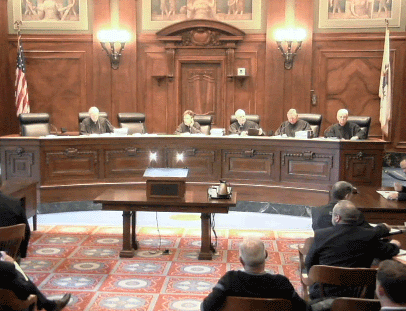AFSCME battles to protect Chicago pensions at Supreme Court
AFSCME’s battle to overturn pension cuts affecting city of Chicago employees and retirees is now in the hands of the Illinois Supreme Court. In oral arguments before the high court on Nov. 17, attorneys for the union and our partners—the Chicago Teachers Union, Illinois Nurses Association and Teamsters Local 700—made the strong case that the cuts are an unconstitutional violation of the pension protection clause, which says that pension benefits may not be diminished or impaired.
 Pushed by Mayor Rahm Emanuel and passed by the General Assembly as Senate Bill 1922, the legislation slashed the COLA that ensures pension benefits for current and future retirees keep pace with rising costs, and required city employees to pay more for this reduced benefit.
Pushed by Mayor Rahm Emanuel and passed by the General Assembly as Senate Bill 1922, the legislation slashed the COLA that ensures pension benefits for current and future retirees keep pace with rising costs, and required city employees to pay more for this reduced benefit.
AFSCME and other unions successfully sued to overturn the cuts in Cook County Circuit Court. The city’s appeal brought the case before the Supremes, which previously struck down cuts to the pensions of state and university employees and teachers outside Chicago.
At the high court hearing, a city lawyer claimed that pension cuts are necessary to keep the funds from running out of money. He also argued that because the legislation also requires increased employer contributions, it provides workers and retirees with a "net benefit."
But union attorney John Shapiro “poked giant holes in the city’s argument,” the Chicago Sun-Times reported.
“Setting aside money to pay what is already a constitutional guarantee is not a benefit, new or net. Funding provisions cannot justify pension benefit reductions in Illinois,” Shapiro told the Court. “The funding mechanism for employer contributions simply has not matched known fund obligations. Now that the result of that disconnect is intolerable, they just don’t want to pay for the benefits. But, that’s precisely what the pension protection clause precludes.”
The lead plaintiff in the case is Mary Jones, a former Chicago library employee and AFSCME Retirees sub-chapter president.
The union has frequently pointed out that public employees earn and pay toward their modest pension -- little more than $30,00 a year on average -- and that most, including Chicago city employees, aren't eligible for Social Security.
In contrast, the pension debt was caused by politicians who failed to make adequate contributions to the retirement systems, choosing instead to spend those revenues elsewhere. But like the state, the city cannot use the pension funds like credit cards, then cut benefits in order to avoid paying the bill.
Under the circuit court ruling, city employees have already been refunded their higher contributions and retirees paid their full COLA for the current year.
There is no timetable for the state Supreme Court to issue its decision, which could take months.



